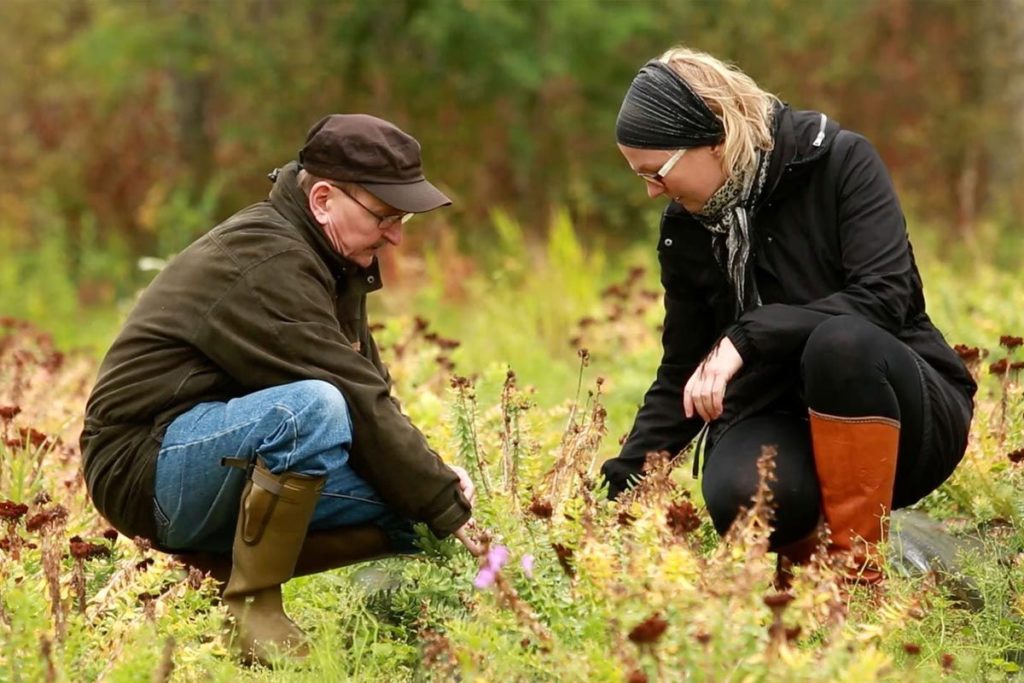Business opportunities for Arctic agriculture
Katja, the young farmer entrepreneur
Katja is a farmer and a young entrepreneur living in the north of Finland, close to Rovaniemi. She has two children. She inherited her farm from her family. Like her mother, she has been working with Lappish plants all her life and hopes her children can continue afterwards. Arctic Warriors is the name of her company, which was chosen because all herbs of the Arctic area are the same in Russia, Norway, Sweden and Finland. Together with two other colleagues, they plant, grow, process angelica roots and rose roots for use in health care products. Thanks to a research project financed by the Kolarctic CBC Programme, she benefits directly from traditional Russian experience with plants from the Arctic circle, and has set up a small business to sell her products. For Katja, nature knows no borders.
Antti, the scientific researcher
“We are here, in Rovaniemi, about 150 km from the Russian border. We need a visa for Russia, but we are used to that, and it is not a problem. We work very well together with Russian colleagues and I have friends there” says Antti Hannukkala, the coordinator of the project. In his university laboratory, this scientific researcher passionately recounts how he has been collaborating with Russia over the last 25 years. His project contributes to improving competitiveness of agriculture in Northern Europe. Among other activities, the project examines the effects of local climate on plant species and experiments on how they can adapt to very rough temperatures and special light conditions, in the most efficient way. Plants produce special protective elements and contain chemical components that can be used in food production and in health care products. The research and development results of the project are then disseminated to farmers and entrepreneurs in Finland, Sweden, Norway and Russia. Students and the wider public are made aware of the results, so they can make more informed consumer decisions.
A strong collaboration with Russia
In this laboratory of Rovaniemi, Finland, researchers experiment on seeds and grow Lappish plants. They study their specific characteristics and collaborate with Russian scientists and academic institutes of the Barents region. Russian scientists have a depth of knowledge on Arctic plants. In Russia, traditional medicine is still very much alive. In pharmacies, chemists will mix plants in front of customers and prepare remedies for specific requests. Russian people use these ancient remedies passed down from their grandparents. In western Europe these traditions have been largely lost. However, health is back on the agenda and people are evermore conscious of the food they consume and the origin of the products they use. “We are united by our geographical position on Earth. Living in the Barents region whether in Sweden, Norway, Russia or Finland, we all have a common interest in this area,” says Antti.
Katja and her colleagues benefit directly from the experiments made in Antti’s research institute based on this Russian knowledge. These results help farmers to grow and process Lappish plants in the most efficient way. They are also important for marketing purposes in order to prove how powerful the plants can be for better health. “It is local, natural. It strengthens your immune system, or helps you to recover from a bad flu” says Katja. Her business is doing very well and Katja is looking into other opportunities thanks to her “magical” Arctic herbs.
Like Katja, several hundred entrepreneurs and farmers in the region of Rovaniemi benefit from the research results of this project and others supported by the Kolarctic CBC Programme. There, above the Arctic Circle, people know that they need each other’s know-how and strengths beyond borders, to survive such unique climate conditions. Because they all have the same reality, the same nature.
Beneficiary: MTT Agrifood Research, FinlandPartners: Norwegian Institute for Agricultural and Environmental Research (Bioforsk) / Russian Academy of Science Polar-Alpine Botanical Garden and Institute (PAGBI) / N.I Vavilov All-Russian Crop Research Institute of the Russian Academy of Agriculture Sciences
Project budget: € 470 000
Priority: Economic and social development
Programme website: http://www.kolarcticenpi.info
